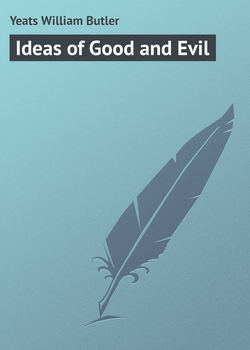Читать книгу Ideas of Good and Evil - Yeats William Butler, William Butler Yeats - Страница 13
THE HAPPIEST OF THE POETS
III
ОглавлениеI think of his men as with broad brows and golden beards and mild eyes and tranquil speech, and of his good women as like ‘The Bride’ in whose face Rossetti saw and painted for once the abundance of earth and not the half-hidden light of his star. They are not in love with love for its own sake, with a love that is apart from the world or at enmity with it, as Swinburne imagines Mary Stuart and as all men have imagined Helen. They do not seek in love that ecstasy, which Shelley’s nightingale called death, that extremity of life in which life seems to pass away like the Phœnix in flame of its own lighting, but rather a gentle self-surrender that would lose more than half its sweetness if it lost the savour of coming days. They are good house-wives; they sit often at the embroidery frame, and they have wisdom in flocks and herds and they are before all fruitful mothers. It seems at times as if their love was less a passion for one man out of the world than submission to the hazard of destiny, and the hope of motherhood and the innocent desire of the body. They accept changes and chances of life as gladly as they accept spring and summer and autumn and winter, and because they have sat under the shadow of the Green Tree and drunk the Waters of Abundance out of their hollow hands, the barren blossoms do not seem to them the most beautiful. When Habundia takes the shape of Birdalone she comes first as a young naked girl standing among great trees, and then as an old carline, Birdalone in stately old age. And when she praises Birdalone’s naked body, and speaks of the desire it shall awaken, praise and desire are innocent because they would not break the links that chain the days to one another. The desire seems not other than the desire of the bird for its mate in the heart of the wood, and we listen to that joyous praise as though a bird watching its plumage in still water had begun to sing in its joy, or as if we heard hawk praising hawk in the middle air, and because it is the praise of one made for all noble life and not for pleasure only, it seems, though it is the praise of the body, that it is the noblest praise.
Birdalone has never seen her image but in ‘a broad latten-dish,’ so the wood woman must tell her of her body and praise it.
‘Thus it is with thee; thou standest before me a tall and slim maiden, somewhat thin as befitteth thy seventeen summers; where thy flesh is bare of wont, as thy throat and thine arms and thy legs from the middle down, it is tanned a beauteous colour, but otherwhere it is even as fair a white, wholesome and clean as if the golden sunlight which fulfilleth the promise of the earth were playing therein… Delicate and clean-made is the little trench that goeth from thy mouth to thy lips, and sweet it is, and there is more might in it than in sweet words spoken. Thy lips they are of the finest fashion, yet rather thin than full; and some would not have it so; but I would, whereas I see therein a sign of thy valiancy and friendliness. Surely he who did thy carven chin had a mind to a master work and did no less. Great was the deftness of thine imaginer, and he would have all folk who see thee wonder at thy deep thinking and thy carefulness and thy kindness. Ah, maiden! is it so that thy thoughts are ever deep and solemn? Yet at least I know it of thee that they be hale and true and sweet.
‘My friend, when thou hast a mirror, some of all this shalt thou see, but not all; and when thou hast a lover some deal wilt thou hear, but not all. But now thy she-friend may tell it thee all, if she have eyes to see it, as have I; whereas no man could say so much of thee before the mere love should overtake him, and turn his speech into the folly of love and the madness of desire.’
All his good women, whether it is Danaë in her tower, or that woman in The Wood beyond the World who can make the withered flowers in her girdle grow young again by the touch of her hand, are of the kin of the wood woman. All his bad women too and his half-bad women are of her kin. The evils their enchantments make are a disordered abundance like that of weedy places and they are cruel as wild creatures are cruel and they have unbridled desires. One finds these evils in their typical shape in that isle of the Wondrous Isles, where the wicked witch has her pleasure-house and her prison, and in that ‘isle of the old and the young,’ where until her enchantment is broken second childhood watches over children who never grow old and who seem to the bystander who knows their story ‘like images’ or like ‘the rabbits on the grass.’ It is as though Nature spoke through him at all times in the mood that is upon her when she is opening the apple-blossom or reddening the apple or thickening the shadow of the boughs, and that the men and women of his verse and of his stories are all the ministers of her mood.
